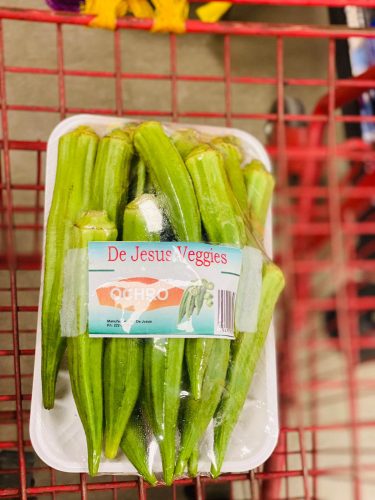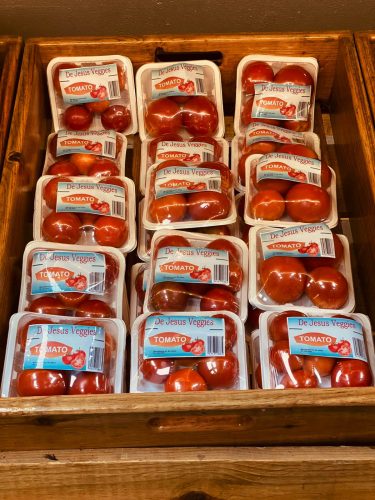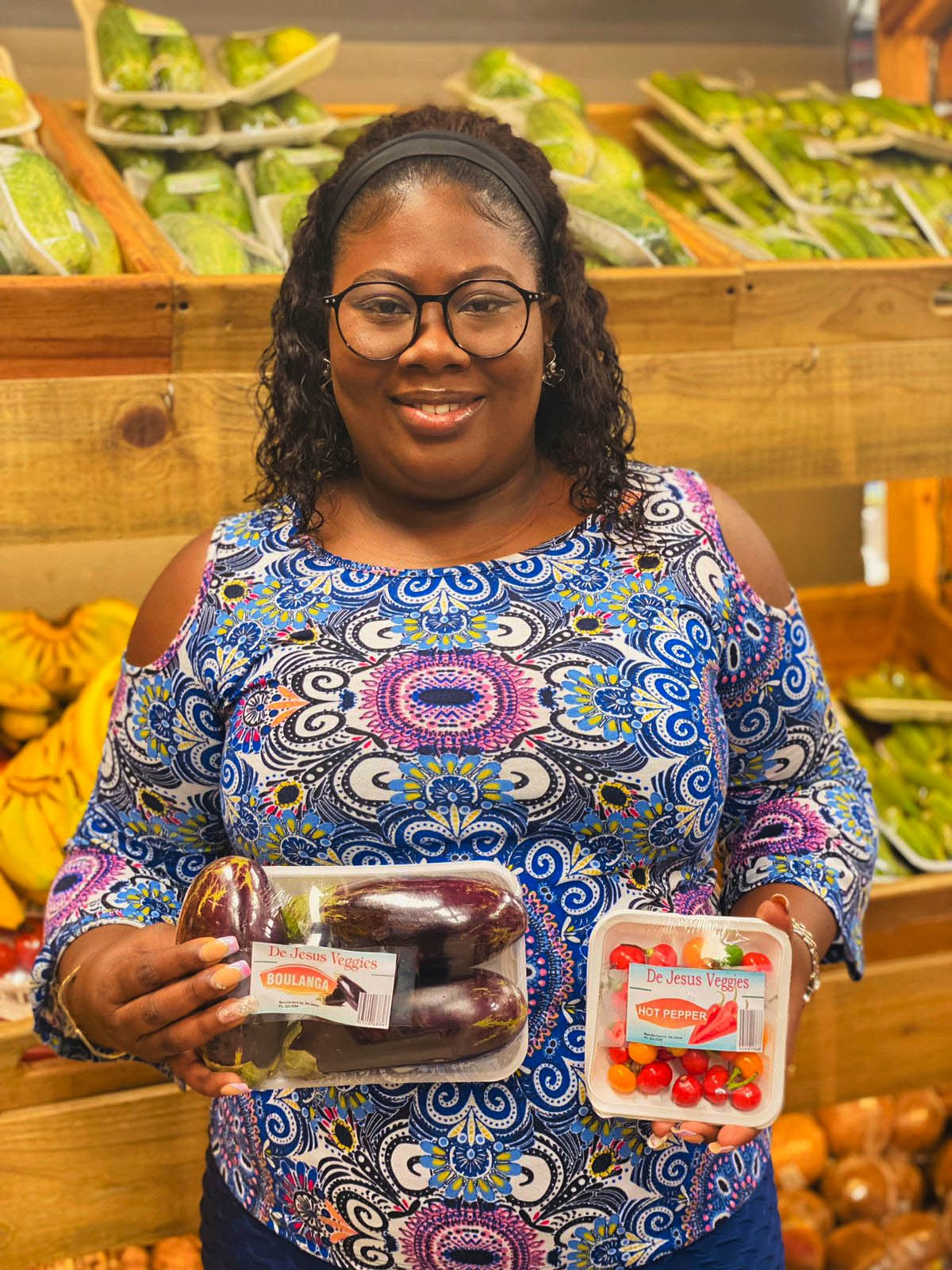If Guyana’s municipal markets still remain the country’s ‘mecca’ insofar as trading in fruit and vegetables is concerned, the response by local supermarkets to consumer demand for ‘convenience shopping’ has created new opportunities for entrepreneurially inclined Guyanese. While the ‘hustle and bustle’ of crowded markets continues to be favoured by shoppers who still see what is essentially a weekend pursuit as a welcome diversion from the customary home-to-work routine, increasingly time-challenged Guyanese have come to appreciate the value of what is perhaps best described as one-stop food shopping.

Whether the idea of removing fresh greens and vegetables from the hustle and bustle of the municipal market into the more sedate (sanitized?) environment originated with local supermarket owners, or otherwise, is unclear. What is now known, however, is that increasing numbers of local shoppers have embraced the idea of ‘picking’ up neatly packaged ‘manicured’ fruits and vegetables that can be deposited in a shopping trolley as easy as you can, with a loaf of bread or a package of rice. If, perhaps unsurprisingly, the traditionalists still frown on the idea, it has opened up new entrepreneurial opportunities into which significant numbers of service providers have slipped quietly.
If there have been instances in which the supermarket owners have themselves gone directly to the farmers to ‘cut’ such deals, eagle-eyed middlemen (and women) continue to carve their own niches in the sector……and the available evidence suggests that this particular trading practice is here to stay. A visit by the Stabroek Business to the Alexander street branch of the Kitty Market a few weeks ago brought us face to face with Rushanna De Jesus-Dover an amiable young woman who was not in the least bit offended when we inquired as to why she was standing in a quiet corner of a busy supermarket packaging Okra in plastic-wrapped polystyrene packages ‘adorned’ with small labels marked ‘De Jesus Veggies.’
She was accommodating…quickly briefing us on the story of the role of ‘De Jesus Veggies’ as the link between the plots of vegetables on the various farms and the sanitized environment of the supermarket where packaging and presentation had been applied to the ordinary farm produce to cause it to ‘fit in’ with the other items on display. Inside the supermarket. Rushanna was busy with her packaging and presentation chore. We agreed to meet in a more convivial environment.

Rushanna had worked in both the public and private sectors and, these days, is the Proprietor of ‘De Jesus Veggies’. It was established in 2017 and is located at Liliendaal on East Coast Demerara. A mother and daughter initiative, it was created by herself and her mother after a friend had made them aware of the fact that supermarkets were ‘in the business’ of buying and re-selling vegetables.
The procedure, she explained, proved to be a somewhat demanding departure from the municipal market routine. It was a matter of submitting a written application to ‘management along with samples of the vegetables being offered and the prices at which they were being offered.’ The applicant was also required to persuade the supermarket on the issue of reliability of supplies. The submission by De Jesus Veggies secured ‘the nod’ of the Bounty Supermarket.
Though not unused to working under pressure, Rushanna conceded that she had, ‘back then,’ found the demands associated with accumulating and properly preparing the volumes of product necessary to meet the demands of both the Kitty and Regent Street Bounty ‘outlets’ quite demanding. Over time, it dawned on her that a choice would have to be made between what was turning out to be a fairly lucrative business arrangement with the Bounty Supermarkets when compared with the returns from her Public Sector position. A choice had to be made and, she concedes, it was not a particularly difficult one.
Her routine begins at around 5 am after her husband, Dangelo, returns from the market with vegetable purchases made from farmers with whom they customarily ‘do business.’ Then would begin the procedure of selecting the vegetables to arrive at a determination on issues of ‘freshness.’ The Bounty Supermarkets, Rushanna says, ‘takes no prisoners’ on issues of quality. Afterwards, the inspected vegetables are washed and subjected to about three hours of air-drying. After those processes have been exhausted the vegetables are packaged in their biodegradable containers which are then plastic-wrapped and sealed, labeled and delivered to the Supermarkets.
Visual appearance, Rushanna says, is crucial to meeting the standard demanded by the Bounty establishment. Customer appeal had to begin with the physical appearance of the presentation. The contractual arrangement stipulates that vegetables enjoy a ‘shelf life’ of five days. Part of the ‘agreement’ requires that the supplier visit the supermarkets at intervals to check on the condition of the product. Needless to say De Jesus is proud of the relationship that she enjoys with one of the country’s high-profile supermarkets. If her re-stocking of shelves coincides with the ‘heavy’ shopping, engagements with customers arising out of generous ‘pats on the back’ over the quality of the vegetables that she provides is what she delights in, she admits. “I intend to keep it that way,” she says.
Evidence of growth and expansion in the pursuit is reflected in the fact that whereas De Jesus Veggies began plying its trade with eight vegetables, the number has increased to twelve. Peppers Boulanger, Celery, Okra, Cucumber and Bora are “good sellers,” she says. Nor does the challenge begin and end with her interaction with the supermarket which serves as an outlet for her vegetables, De Jesus says. Engaging her buyers on matters relating to price increases requires that she continually interact with sellers on the issue of prices. The arrangement is fueled by a system that requires her own suppliers to provide her with advance notice of likely price fluctuation. This information properly positions her for engagements with the supermarket on issues of price movement.
What, these days, can be mind-boggling price movements can sometimes throw distracting ‘spanners’ in the ‘works.’ Citing an example, De Jesus told the Stabroek Business that whereas the market price for ‘wiri wiri’ peppers was $300 per pint just a few weeks ago, they have now made an enormous leap to $1,000 per pint. Such maddening price increases, she says, usually do not sit well with her own customers. The experience, Roshanna says, has been worthwhile enough to cause her to contemplate expansion into fresh fruits. This, she says, is hinged to plans to establish a farm of her own, a giant leap that will require careful contemplation and considerable investment.




